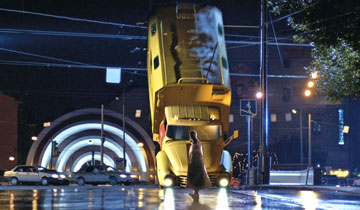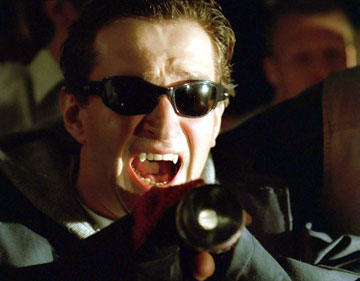

It's always fascinating to see what ordinary audiences flock to in other countries. It's normal for Russia to send over art films like Russian Ark, The Return, or House of Fools, it is less so to see something like Night Watch. Night Watch, based on the novel by Sergei Lukyanenko, is the wildly popular Russian action/horror film that broke box office records in its native land. So what can Americans learn from watching Night Watch? Well, big action/horror films are pretty much the same anywhere. Lots of explosions, blood, special effects, and sounds, and not as much story.
Part of this stems from the fact that Night Watch is the first in a trilogy of films. Instead of getting one cohesive beginning and ending, director Timur Bekmambetov (The Arena), who adapted the film with Laeta Kalogridis (Alexander), come up with something that feels like an extended introduction. Lukyanenko's novel has a huge amount of backstory, and Bekmambetov and Kalogridis spend much of the plot with exposition and background. Most movies develop sequels if the first one does well. This ensures that the first film feels like a complete story. This is not the case with Night Watch, which has one of those really annoying cliffhanger endings.
The convoluted story resembles that of Underworld - two centuries old groups battle for supremacy while the modern world proceeds without any knowledge. This time, the groups are the forces of good and evil, made up of people with special powers like sorcerers, vampires, and shape-shifters. They made a truce long ago with religious overtones. Neither side could exert influence on ordinary people; they were free to choose between good and evil. Each side has their own "police" force - the Night Watch work for side of good, and the Day Watch (not-so-coincidentally the name of the sequel) work for the side of evil. Looming in the distance is an old prophecy of one who would rise who had the power to tip the scales of power to one side or another. Anton Gorodetsky (Konstantin Khabensky, Us, In Movement) is a relatively new member of the Night Watch who is still struggling with his powers. Gorodetsky will somehow play a part in this prophecy.
While the narrative and pacing are a bit murky, Night Watch comes alive with its visuals. There's nothing groundbreaking going on here. Bekmambetov knows what he wants, and knows how to do it. The sets are grungy, the lighting is dark, and everything has a sinister feel to it. Vampires appear and disappear into "the Gloom," a supernatural otherworld, and Gorodetsky moves around town with nightmarish visions of vortexes and bats. Bekmambetov uses his visuals to add a sense of creepiness and danger to Night Watch, something that helps people look beyond the endless dialogue. Things will hopefully pick up for the next installment.